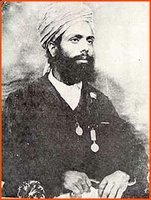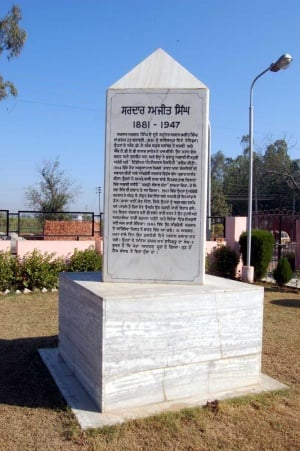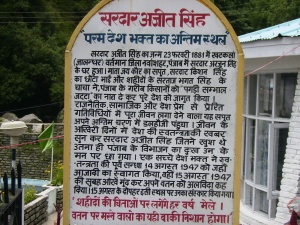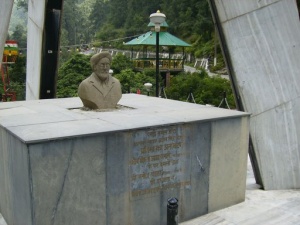Sardar Ajit Singh
Sardar Ajit Singh Sindhu was born in a military family from Punjab in India. He was the first man in the Punjab who resented the high-handedness of the British rule, and he openly criticized the government. He was declared a political rebel and he had to spend much of his life in jail. He was in Naples when WWII broke out. He was asked to teach Persian at a University in Naples. He also gave a number of speeches in Hindustani broadcasting to Indian soldiers serving in the British Army in North Africa. His speeches were aimed at raising an Azad Hind Fauj to fight against the British in India.
Sardar Ajit Singh was the uncle of Sardar Bhagat Singh.
He was born at Khatkarkalan village in Jalandhar District. He studied at D.A.V. College, Lahore and later on at Law College, Barreily. He plunged into the freedom movement and left his law studies. In 1907, he was deported to Mandalay Jail in Burma along with Lala Lajpat Rai. After his release, he fled to Iran, rapidly developed as a centre for revolutionary activities by groups led by Sardar Ajit Singh and Sufi Amba Prasad who had worked there since 1909. The recruits to these groups included young nationalists of the likes of Rhishikesh Letha, Zia-ul-Haq and Thakur Das. By 1910, the activities of these groups and their publication, the Hayat, had been noticed by British intelligence. Reports as early as 1910 indicated German efforts to unite Turkey and Persia and proceed to Afghanistan to threaten British India. However, Ajit Singh's departure in 1911 brought the Indian revolutionary activities to a grinding halt, while British representations to Persia successfully curbed whatever activity that remained in the country. From there, he traveled to Rome, Geneva, Paris, and Rio de Janeiro.
In 1918, he came in close contact with the Ghadar Party in San Francisco. In 1939, he returned to Europe and later on helped Netaji Subhas Chandra Bose in his mission in Italy. In 1946, he came back to India at the invitation of Pandit Jawahar Lal Nehru. After spending some time in Delhi, he came to Dalhousie.
On August 15, 1947 he breathed his last breath. On this date India got its Independence. His last words were, "Thank God, my mission is fulfilled."
A samadhi in his memory is at Panjpula, a popular and scenic picnic spot in Dalhousie.
References
- 1. ^ Yadav 1992, p. 29
- 2. ^ a b c Yadav 1992, p. 30
- Yadav, B.D (1992), M.P.T. Acharya, Reminiscences of an Indian Revolutionary, Anmol Publications Pvt ltd, ISBN 8170414709.




